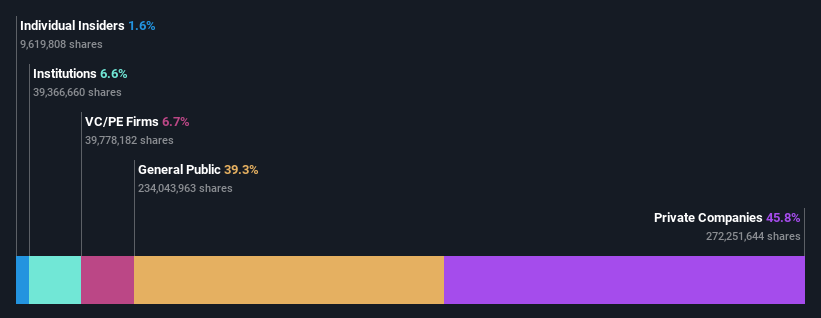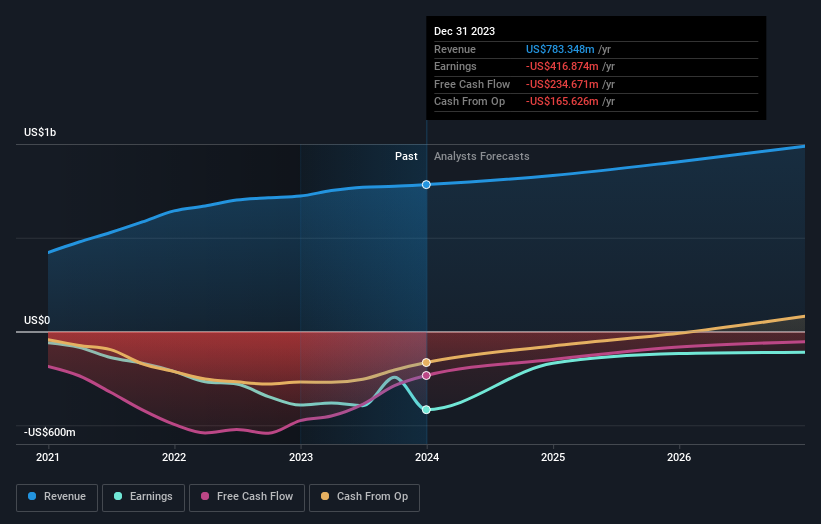Stock Analysis
- United States
- /
- Food
- /
- NasdaqGS:OTLY
Private companies in Oatly Group AB (NASDAQ:OTLY) are its biggest bettors, and their bets paid off as stock gained 12% last week

Key Insights
- Significant control over Oatly Group by private companies implies that the general public has more power to influence management and governance-related decisions
- 52% of the business is held by the top 2 shareholders
- Analyst forecasts along with ownership data serve to give a strong idea about prospects for a business
To get a sense of who is truly in control of Oatly Group AB (NASDAQ:OTLY), it is important to understand the ownership structure of the business. The group holding the most number of shares in the company, around 46% to be precise, is private companies. In other words, the group stands to gain the most (or lose the most) from their investment into the company.
As a result, private companies were the biggest beneficiaries of last week’s 12% gain.
Let's take a closer look to see what the different types of shareholders can tell us about Oatly Group.
See our latest analysis for Oatly Group

What Does The Institutional Ownership Tell Us About Oatly Group?
Institutions typically measure themselves against a benchmark when reporting to their own investors, so they often become more enthusiastic about a stock once it's included in a major index. We would expect most companies to have some institutions on the register, especially if they are growing.
Oatly Group already has institutions on the share registry. Indeed, they own a respectable stake in the company. This can indicate that the company has a certain degree of credibility in the investment community. However, it is best to be wary of relying on the supposed validation that comes with institutional investors. They too, get it wrong sometimes. If multiple institutions change their view on a stock at the same time, you could see the share price drop fast. It's therefore worth looking at Oatly Group's earnings history below. Of course, the future is what really matters.

Hedge funds don't have many shares in Oatly Group. The company's largest shareholder is China Resources Verlinvest Health Investment Limited, with ownership of 46%. In comparison, the second and third largest shareholders hold about 6.7% and 1.5% of the stock. Toni Petersson, who is the third-largest shareholder, also happens to hold the title of Co-Chairman of the Board.
After doing some more digging, we found that the top 2 shareholders collectively control more than half of the company's shares, implying that they have considerable power to influence the company's decisions.
While studying institutional ownership for a company can add value to your research, it is also a good practice to research analyst recommendations to get a deeper understand of a stock's expected performance. Quite a few analysts cover the stock, so you could look into forecast growth quite easily.
Insider Ownership Of Oatly Group
The definition of company insiders can be subjective and does vary between jurisdictions. Our data reflects individual insiders, capturing board members at the very least. Company management run the business, but the CEO will answer to the board, even if he or she is a member of it.
I generally consider insider ownership to be a good thing. However, on some occasions it makes it more difficult for other shareholders to hold the board accountable for decisions.
We can see that insiders own shares in Oatly Group AB. It has a market capitalization of just US$613m, and insiders have US$9.9m worth of shares, in their own names. Some would say this shows alignment of interests between shareholders and the board. But it might be worth checking if those insiders have been selling.
General Public Ownership
The general public, who are usually individual investors, hold a 39% stake in Oatly Group. While this group can't necessarily call the shots, it can certainly have a real influence on how the company is run.
Private Equity Ownership
With an ownership of 6.7%, private equity firms are in a position to play a role in shaping corporate strategy with a focus on value creation. Some investors might be encouraged by this, since private equity are sometimes able to encourage strategies that help the market see the value in the company. Alternatively, those holders might be exiting the investment after taking it public.
Private Company Ownership
Our data indicates that Private Companies hold 46%, of the company's shares. It might be worth looking deeper into this. If related parties, such as insiders, have an interest in one of these private companies, that should be disclosed in the annual report. Private companies may also have a strategic interest in the company.
Next Steps:
I find it very interesting to look at who exactly owns a company. But to truly gain insight, we need to consider other information, too. Be aware that Oatly Group is showing 1 warning sign in our investment analysis , you should know about...
Ultimately the future is most important. You can access this free report on analyst forecasts for the company.
NB: Figures in this article are calculated using data from the last twelve months, which refer to the 12-month period ending on the last date of the month the financial statement is dated. This may not be consistent with full year annual report figures.
Valuation is complex, but we're helping make it simple.
Find out whether Oatly Group is potentially over or undervalued by checking out our comprehensive analysis, which includes fair value estimates, risks and warnings, dividends, insider transactions and financial health.
View the Free AnalysisHave feedback on this article? Concerned about the content? Get in touch with us directly. Alternatively, email editorial-team (at) simplywallst.com.
This article by Simply Wall St is general in nature. We provide commentary based on historical data and analyst forecasts only using an unbiased methodology and our articles are not intended to be financial advice. It does not constitute a recommendation to buy or sell any stock, and does not take account of your objectives, or your financial situation. We aim to bring you long-term focused analysis driven by fundamental data. Note that our analysis may not factor in the latest price-sensitive company announcements or qualitative material. Simply Wall St has no position in any stocks mentioned.
About NasdaqGS:OTLY
Oatly Group
Oatly Group AB, an oatmilk company, provides a range of plant-based dairy products made from oats in Europe, the Middle East, Africa, the Americas, and Asia.
Mediocre balance sheet and slightly overvalued.

